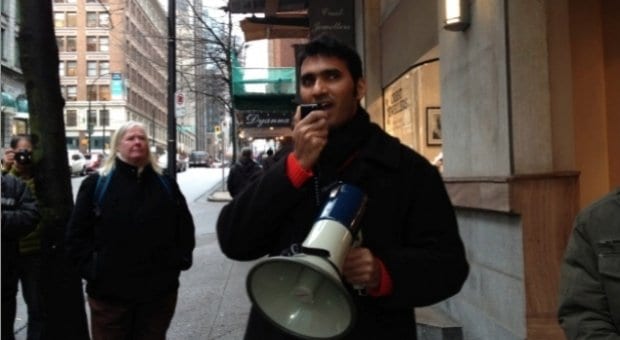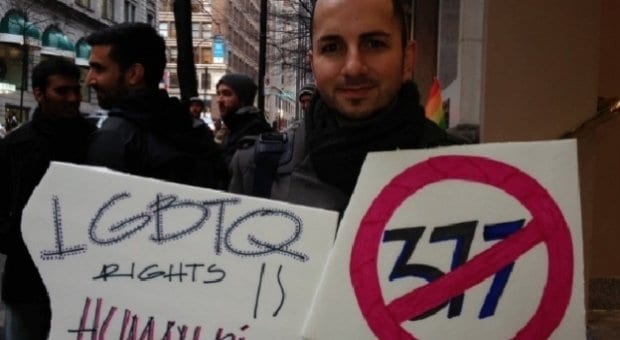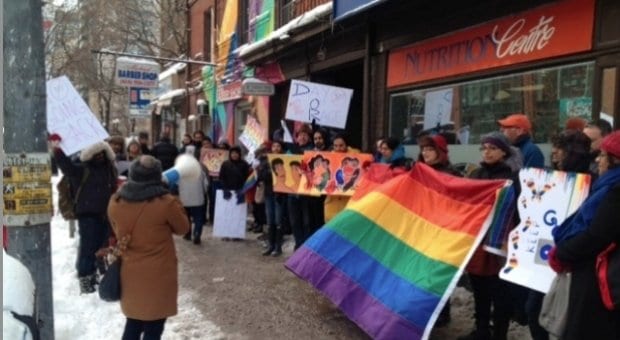
Harish Murthy coordinated the Vancouver protest against the reinstatement of Section 377 in India. Credit: Natasha Barsotti

Zdravko Cimbaljevic, a well-known gay activist from Montenegro, says the protest against Section 377 is his first act of activism since he was granted asylum in Canada two weeks ago. Credit: Natasha Barsotti
Under a light drizzle, about 25 people gathered outside the Indian consulate in Vancouver Dec 13 to protest the reinstatement of a colonial-era law that criminalizes gay sex in India.
The small and intermittently vocal crowd bore signs that read, “It’s 2013 not 1860,” “All love is equal,” and “Say no to 377,” a reference to the Indian Penal Code section that prohibits “carnal knowledge against the order of nature.”
Since the Indian Supreme Court’s Dec 11 ruling set aside a Delhi high court decision that struck down Section 377, there has been an outpouring of anger and criticism at what many in India and abroad have characterized as a significant setback for human rights in the country.
“The Supreme Court of India decided that me, as a gay person of Indian origin, a citizen of India, is no longer legal and cannot live as he pleases,” Harish Murthy, coordinator of the Vancouver protest, told the gathering outside the consulate.
Murthy says the court acted carelessly and “passed the buck” to the legislature when it ruled that it was up to parliament — not the courts — to change Section 377.
“I went through a personal sense of deep hurt that quickly turned into a serious commitment to do something,” says Murthy, who drew inspiration to organize a local protest from the people in India who are “marching, protesting, speaking their minds.”
Murthy recently became a resident of Canada but says he feels a responsibility to “not just move along and just say my life is okay.”
Murthy joined protest co-organizer Fatima Jaffer, of Trikone Vancouver, and a number of other participants as they entered the consulate to hand deliver a petition addressed to Indian Prime Minister Manmohan Singh.
Officials said the consul general was not in the building but promised to deliver the document to him.
The petition, in part, calls on the Indian government to “take immediate proactive steps to rescind Indian Penal Code 377 and to decriminalize sexual activities between consenting adults, in particular homosexuality.”
“We also urge the government of India to enact legislative measures and pass laws in the Indian parliament to provide full equality rights to sexual and gender minorities in all segments of Indian society,” it further states.
The petition says it is an “irrefutable fact that homosexuality in India, as elsewhere, has existed throughout time. It is hardly foreign to India. This decision however sends the message that Indians cannot be homosexuals and if they are, they are not worthy of the same protections as any other citizen.”
Vancouver West End MLA Spencer Chandra Herbert says it wasn’t that long ago that a law similar to India’s Section 377 criminalized homosexuality in Canada. Homosexuality was decriminalized in Canada in 1969.
Rights are rarely given, Chandra Herbert says; they’re won.
“The Supreme Court, supposedly the place of the best minds, the best brilliance in India, decided to criminalize love once again,” he says. “We will not stop until that law is changed.”
Little Sister’s manager Janine Fuller says the Indian court’s ruling reminded her of the bookstore’s fight with Canada Customs, which seized years worth of books destined for the store, deeming them obscene.
“It has been something that has been fought from day one by the queer community through the courts, and not through the pleasure and the efforts of many government officials, except for a few.”
“We have no right to even consider any struggle finished in our own hearts until we are absolutely committed to the ones in India,” she says. “We can only hope that the struggle is way faster in India than it was for Canada Customs and Little Sister’s.”
Zdravko Cimbaljevic, a well-known gay activist from Montenegro, says the protest against Section 377 is his first act of activism since he was granted asylum in Canada two weeks ago.
“I came here to support my brothers and sisters in India who are struggling with this,” says Cimbaljevic, who ran the advocacy group LGBT Forum Progress in his native country and faced death threats and attacks from anti-gay opponents.
“Being an activist, there’s no borders, there’s no boundaries. I’ll always stand for the rights of LGBTIQ people wherever they are. I have Indian friends, and I really want to show them that I am with them, though they couldn’t come here today or are in India,” he told Xtra.
He says it’s great to see both LGBT groups and allies organizing around the issue.
Approximately 30 people gathered under a mural honouring the South Asian community at the intersection of Church and Wellesley streets in Toronto Dec 15 to stand in solidarity with queer people in India during a Global Day of Rage against the Supreme Court’s decision. The group stood beside Meera Sethi’s mural on the northwest corner.
People in at least 36 cities around the world participated in rallies to publicly condemn the ruling.
Vijaya Chikermane, executive director of Alliance for South Asian AIDS Prevention (ASAAP), who organized the Toronto demonstration, says it’s important for India’s queer community to know they have the support of the international community.
“This decision was just completely shocking,” she says. “The good thing to come out of this [is that] the court hasn’t been met with a lot of support, even within India. It is being very critiqued. We are also seeing Indian political leaders come out and speak about how unfortunate and disappointing it is. It is a huge setback.”
Chikermane says it’s important to remember that Section 377 is a colonial law left over from British rule. “Internationally, I have not seen a lot of official statements coming out of governments or institutions. But it was so heartening to see all these amazing images from people protesting around the world yesterday. That was fantastic to see.”
“It’s so important for our community to realize there was a voice here. It sends a message to India that they are not alone. There is love behind you.”
In the leadup to this weekend’s protests, Facebook user Tanmay Sahay encouraged people to upload profile pictures of themselves kissing someone of the same gender to show their support for LGBT Indians.
With files from Andrea Houston in Toronto


 Why you can trust Xtra
Why you can trust Xtra


